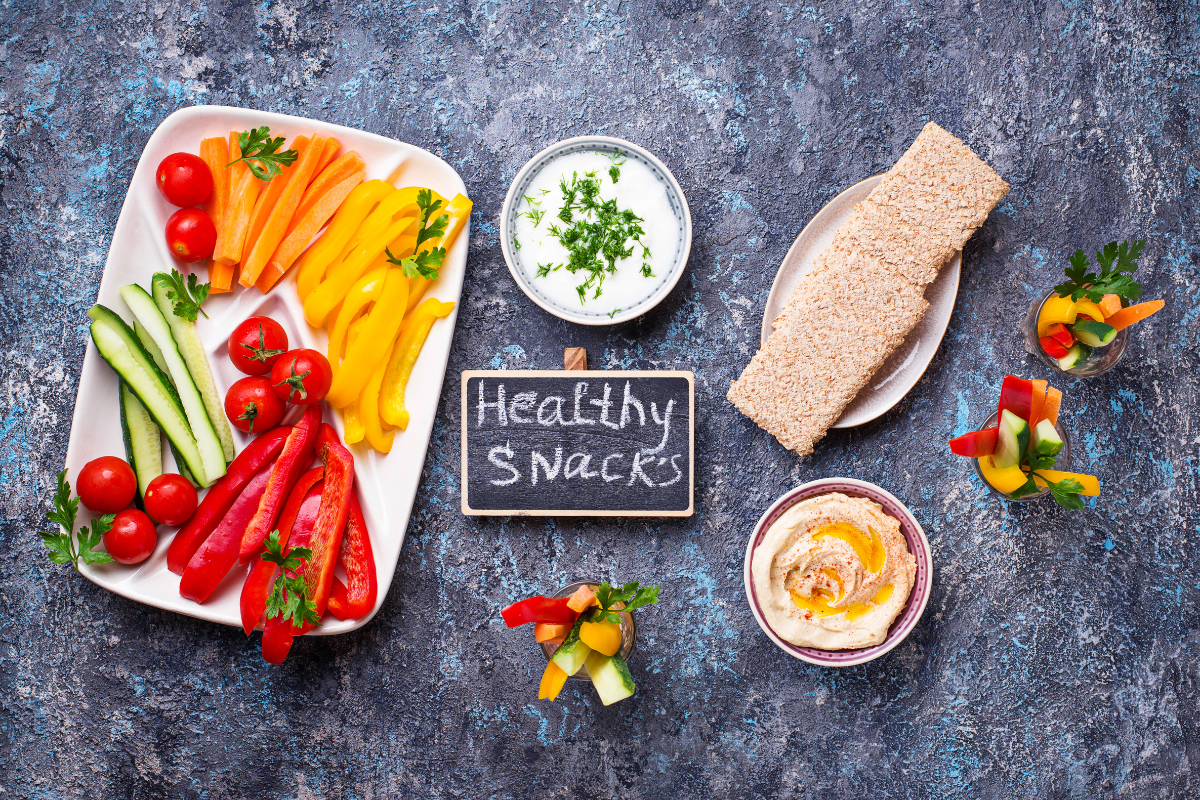In today’s fast-paced world, snacking has become an integral part of our daily routines. However, the choices we make when it comes to snacking can significantly impact our health and well-being. Opting for healthy snacks not only satisfies our cravings but also provides essential nutrients and aids in disease prevention. In this comprehensive guide, we will delve into the world of the best healthy snacks, highlighting their benefits and the diseases they may help manage.

Nuts and Seeds
Nuts and seeds are tiny powerhouses of nutrition, delivering a remarkable blend of healthy fats, protein, fiber, vitamins, and minerals. Almonds, walnuts, chia seeds, and flaxseeds are particularly noteworthy options in this category.
Almonds:
- Rich in monounsaturated fats, almonds are known to support heart health by reducing bad cholesterol levels and promoting good cholesterol.
- Packed with vitamin E, an antioxidant that helps protect cells from oxidative stress, almonds contribute to overall immune system health.
- Their magnesium content supports muscle function, nerve transmission, and bone health.
Walnuts:
- Walnuts stand out for their high content of alpha-linolenic acid (ALA), an omega-3 fatty acid that supports brain health and helps reduce inflammation.
- They contain antioxidants like vitamin E, melatonin, and polyphenols, which play a role in cellular protection.
- Walnuts’ fiber content aids digestion, contributes to a feeling of fullness, and supports gut health.
Chia Seeds:
- Chia seeds are a fantastic source of plant-based omega-3 fatty acids, contributing to heart health and reducing inflammation.
- Their soluble fiber forms a gel-like substance when mixed with liquid, aiding digestion, promoting satiety, and stabilizing blood sugar levels.
- Chia seeds are rich in calcium, magnesium, and phosphorus, all of which support bone health.
Flaxseeds:
- Flaxseeds are another excellent source of ALA omega-3 fatty acids, offering similar brain and heart health benefits.
- Lignans, compounds found in flaxseeds, have antioxidant and estrogen-like properties, potentially reducing the risk of certain cancers.
- Flaxseeds’ fiber content supports digestive regularity and may contribute to lowering LDL cholesterol.
Disease Management:
- Heart Disease: The combination of healthy fats, antioxidants, and fiber in nuts and seeds helps reduce the risk of heart disease by improving cholesterol profiles and reducing inflammation.
- Diabetes: The fiber content aids in controlling blood sugar levels and may contribute to better glycemic control.
Greek Yogurt
Greek yogurt is a creamy, tangy delight that offers numerous health benefits due to its unique nutrient profile.
Benefits:
- With a higher protein content than regular yogurt, Greek yogurt helps build and repair tissues, supports muscle maintenance, and promotes satiety.
- The live probiotics present in yogurt, such as Lactobacillus and Bifidobacterium strains, contribute to a healthy gut microbiome, aiding digestion and boosting immune function.
- Greek yogurt is a valuable source of calcium and vitamin D, vital for maintaining strong bones and teeth.
Disease Management:
- Digestive Disorders: The probiotics in Greek yogurt can help alleviate symptoms of digestive disorders like irritable bowel syndrome (IBS) by promoting gut health and balance.
- Osteoporosis: The calcium and vitamin D content in Greek yogurt contribute to bone health, reducing the risk of osteoporosis.

Fresh Fruits
Nature’s candy, fresh fruits are vibrant, delicious, and packed with essential nutrients.
Apples:
- Apples are rich in soluble fiber, mainly pectin, which supports digestive health by promoting regular bowel movements and aiding in the management of diarrhea and constipation.
- The antioxidants in apples, such as quercetin, have anti-inflammatory properties and may contribute to reducing the risk of chronic diseases.
Berries (e.g., Blueberries, Strawberries):
- Berries are loaded with antioxidants called anthocyanins, which have been linked to improved cognitive function and reduced oxidative stress.
- Their low glycemic index and fiber content contribute to stable blood sugar levels, making them suitable for individuals with diabetes.
Oranges:
- Oranges are an excellent source of vitamin C, an antioxidant that supports immune function, collagen production, and wound healing.
- The fiber in oranges, primarily found in the pulp, aids digestion and can help regulate cholesterol levels.
Grapes:
- Grapes contain resveratrol, an antioxidant compound that may have heart-protective effects by promoting healthy blood vessels and reducing inflammation.
- The skin of red grapes contains additional antioxidants that contribute to overall cellular health.
Disease Management:
- Obesity: The fiber and water content in fruits promote a feeling of fullness, which can aid in weight management by preventing overeating.
- Cancer: The antioxidants and phytochemicals present in various fruits may contribute to reducing the risk of certain cancers by neutralizing harmful free radicals.
Hummus and Veggies
Combining the goodness of chickpeas and vegetables, hummus and veggie sticks make for a delightful and nutrient-rich snack.
Chickpeas:
- Chickpeas are a versatile legume rich in plant-based protein, making them a valuable source of amino acids for vegans and vegetarians.
- They have a low glycemic index, leading to gradual increases in blood sugar levels and improved blood sugar control.
- The soluble fiber in chickpeas supports digestive health and may help manage cholesterol levels.
Hummus:
- Hummus is made from chickpeas blended with olive oil, tahini (sesame paste), lemon juice, and garlic, creating a balanced mix of healthy fats, protein, and carbohydrates.
- The monounsaturated fats from olive oil contribute to heart health by improving cholesterol profiles and reducing inflammation.
- Tahini provides additional healthy fats, along with essential minerals like calcium and magnesium.
Vegetables:
- Vegetable sticks, such as carrots, celery, bell peppers, and cucumber, are rich in vitamins, minerals, and antioxidants that support overall health and well-being.
- The fiber in vegetables complements the chickpeas and hummus, aiding digestion and promoting gut health.
Disease Management:
- Chronic Inflammation: The combination of chickpeas, olive oil, and vegetables offers anti-inflammatory properties that can assist in managing conditions characterized by inflammation, such as arthritis.
- Digestive Health: Both chickpeas and vegetables provide fiber that feeds beneficial gut bacteria, supporting a healthy gut environment and digestion.
Dark Chocolate
Indulging in high-quality dark chocolate can be a guilt-free pleasure with potential health benefits.
Benefits:
- Dark chocolate contains flavonoids and other antioxidants that help protect cells from oxidative damage, potentially reducing the risk of chronic diseases.
- The compounds in dark chocolate have been linked to improved blood flow and lower blood pressure, contributing to heart health.
- Consumption of dark chocolate may enhance mood and cognitive function due to its content of compounds like phenylethylamine (PEA) and theobromine.
Disease Management:
- Heart Health: The antioxidants in dark chocolate, particularly flavonoids, have been associated with improved heart health by promoting blood vessel health and reducing blood pressure.
- Mental Health: Dark chocolate’s compounds can trigger the release of endorphins, promoting a positive mood and reducing stress.
Nut Butter on Whole-grain bread
The combination of nut butter and whole-grain bread creates a satisfying and nutrient-rich snack option.
Nut Butters (e.g., Almond, Peanut):
- Nut butters are a concentrated source of healthy fats, protein, and essential nutrients, contributing to satiety and prolonged energy.
- They provide monounsaturated and polyunsaturated fats that support heart health by improving cholesterol levels and reducing the risk of heart disease.
- Nut butters contain vitamins and minerals like vitamin E, magnesium, and potassium, promoting overall well-being.
Whole Grain Bread:
- Whole-grain bread offers complex carbohydrates that provide sustained energy and prevent rapid spikes in blood sugar levels.
- The fiber in whole-grain bread supports digestive health, helps maintain a healthy weight, and may assist in controlling blood sugar levels.
Disease Management:
- Weight Management: The combination of healthy fats, protein, and fiber in nut butter supports satiety and appetite control, aiding in weight management.
- Type 2 Diabetes: The low glycemic index of whole grain bread combined with the nutrients in nut butter can contribute to better blood sugar regulation.
Incorporating these top healthy snacks into your daily routine not only satisfies your taste buds but also nourishes your body and supports disease management. From the heart-healthy fats in nuts and seeds to the gut-loving probiotics in Greek yogurt, each snack offers a unique set of benefits that contribute to overall wellness. Remember that moderation is key, and a well-balanced diet that includes a variety of nutrient-rich foods will have a more profound impact on your health in the long run. So, the next time you reach for a snack, consider these options that provide both pleasure and purpose.
Always consult with a Health Professional or Nutritionist. They can better inform you about what would be best for your overall health. Seeking and maintaining excellent health is paramount!


